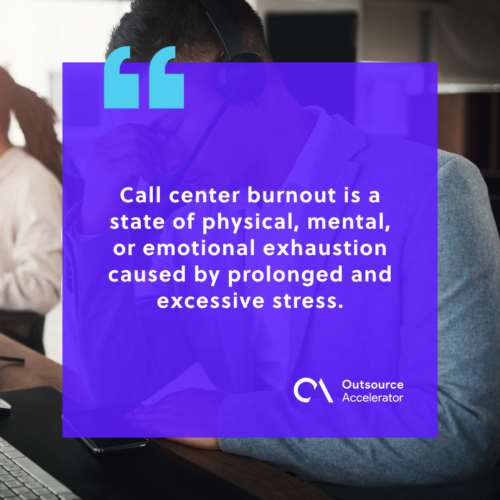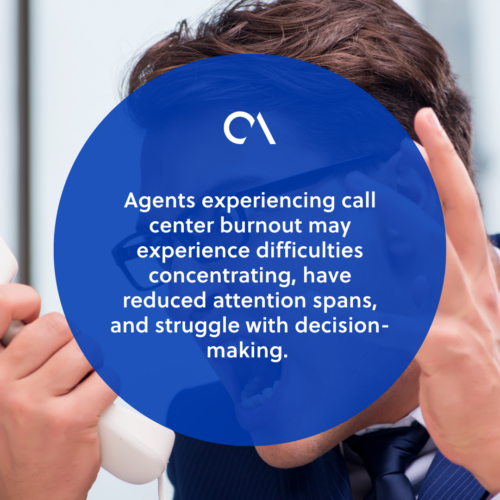How to spot call center burnout among employees and overcome them

Call centers are essential for businesses that aim to provide excellent customer service. However, the demanding nature of its functions can lead to employee burnout, negatively impacting business operations and customer satisfaction.
Call centers currently face challenges in overcoming burnout among employees. Many customers experience a spike in lackluster performance from the agents they talk to. They often find themselves talking to dismissive or rude agents.
Recognizing and addressing call center burnout among employees is a critical concern for businesses in this demanding industry.
This article will outline the common signs and symptoms of call center burnout and how employers can help teams overcome it.
What is call center burnout?
Call center burnout is a state of physical, mental, or emotional exhaustion caused by prolonged and excessive stress. It is a common problem among call center employees, regardless of their experience.
Undeniably, call centers operate in a highly-strict work environment. Agents often face long work hours, over-the-top metrics, irate and rude customers, and toxic coworkers in a single day.
The work environment and repetitive routines often lead them to call center burnout, resulting in decreased job satisfaction, poor performance, and even physical illness.

Who experiences call center burnout?
Regardless of demographics, location, or work experience, all agents can experience call center burnout. However, the industry is mainly left out in terms of this conversation, along with retail, fast food, and warehouse workers.
Statistics show that around 87% of call center agents experience high-stress levels[1] at work. Meanwhile, 77% report having high personal stress due to a lack of work-life balance.
Studies also suggest that many call center workers nowadays are “at the end of their rope.” This is why reducing agent burnout is one of the main priorities for contact centers looking to optimize their operations.
How call center burnout impacts your business
Call center burnout can significantly impact your business in the following ways:
Decreased employee morale
When call center agents experience burnout, their morale plummets, reducing job satisfaction and engagement. Low morale can quickly spread throughout your operations, creating a hostile work environment and negatively impacting team dynamics.
Increased turnover
Exhausted and disengaged agents are more likely to seek alternative employment opportunities, leading to a constant need for hiring and training new staff.
While call centers are known to have high turnover rates, this culture could reflect poorly on your business. This causes disrupted operations and burdens you with additional costs for recruitment, onboarding, and training new hires every time.
A decline in customer satisfaction
Call center agents play a crucial role in shaping customer satisfaction. When agents are burned out, their ability to provide optimal customer experience diminishes.
Burnt-out agents may display decreased empathy, patience, and attentiveness, resulting in frustrated customers. As a result, dissatisfied customers are more likely to switch to your competitors, potentially damaging your brand reputation.
Decreased efficiency
Burnout negatively impacts an agent’s cognitive abilities, concentration, and decision-making skills. Exhausted agents are more prone to errors, decreasing efficiency and productivity.
Quality assurance challenges
Lastly, call center burnout can have a detrimental impact on quality assurance.
Agents who are overwhelmed and exhausted may be less motivated to adhere to quality standards, resulting in a decline in call quality and compliance.
This can lead to regulatory issues, customer complaints, and legal consequences, ultimately damaging your business’s reputation and credibility.
Signs and symptoms of call center burnout
A Gallup study in 2020 reveals that around 76% of workers experience burnout on their job at some point. Managers and supervisors should be careful in recognizing the signs and symptoms of call center burnout to help prevent it from worsening.
Here are ten common signs and symptoms of call center burnout:
Emotional exhaustion
Emotional exhaustion is a core symptom of burnout in different forms, especially in call centers.
Call center agents may feel emotionally drained and depleted due to the demanding nature of their work. They may experience a reduced ability to cope with stress and display signs of emotional detachment.
Physical exhaustion
Call center burnout often manifests as physical exhaustion. Agents may complain of constant fatigue, feeling drained even after a good night’s sleep. They may experience frequent headaches, muscle tension, and a lack of energy.
Social withdrawal
Call center agents experiencing burnout may withdraw socially at work and in their personal lives. They may isolate themselves from colleagues, avoid social interactions, and display a loss of interest in activities they once enjoyed.
Negative attitude
Employees may be antagonistic toward their job, colleagues, and customers. They may become easily frustrated, snap at colleagues or customers, and exhibit a generally pessimistic outlook.
This negativity affects their own well-being and impacts team dynamics and customer interactions, further exacerbating the burnout cycle.
Increased absenteeism
Burnout often leads to increased absenteeism and tardiness among call center employees. Agents may frequently call in sick or late for work due to physical and emotional exhaustion.
This disrupts the call center’s operations and places additional strain on other team members compensating for their absence.
Cognitive difficulties
Studies show that burned-out individuals[2] require more cognitive resources to perform their tasks better.
Agents experiencing call center burnout may experience difficulties concentrating, have reduced attention spans, and struggle with decision-making. These cognitive challenges can lead to errors in call handling, impacting overall performance and customer satisfaction.

Decreased job satisfaction
Agents experiencing burnout often display decreased job satisfaction and engagement. They may lose interest in their work, lack motivation, and feel disillusioned.
Research indicates that emotional burnout is a crucial indicator of job satisfaction in the industry. Call center employees with burnout experience greater dissatisfaction with their job, underscoring the detrimental effects on their overall work experience.
Physical health issues
Long-term burnout can lead to various physical health issues for call center agents. They may experience increased vulnerability to illnesses due to weakened immune systems.
For instance, an agent may have persistent colds or flu that do not easily disappear. It can also manifest as chronic physical pain in the back, stomach cramps, and other illnesses.
Chronic stress associated with burnout has also been linked to cardiovascular problems, depression, and anxiety disorders.
Decreased creativity
Burnout can also impact an agent’s ability to think creatively and solve problems effectively. When individuals experience chronic stress and exhaustion, their cognitive functions, including creativity, can suffer.
This can directly impact the quality of customer service and hinder innovation within the call center.
Sleep disturbance
Sleep disturbances are common among individuals experiencing burnout. Call center agents may struggle with falling asleep, staying asleep, or waking up feeling refreshed.
Lack of quality sleep further contributes to physical exhaustion and negatively impacts their overall well-being.
How to help employees overcome call center burnout
Preventing and overcoming call center burnout requires a proactive approach from managers and supervisors.
Here are five ways to help employees overcome call center burnout:
Foster a positive work culture
Creating a positive work culture is essential for combating burnout. Encourage open communication, provide opportunities for feedback and collaboration, and promote a sense of community among call center employees.
Recognize and appreciate their efforts regularly to boost morale. For example, organizing team-building activities, celebrating achievements, and implementing employee recognition programs can help foster a positive work culture.
Experienced firms like SixEleven are able to accomplish this and keep their employees engaged.
Offer stress management resources
Provide employees with resources and support for managing stress. Offer stress management workshops or training sessions that teach effective coping mechanisms, such as mindfulness techniques or relaxation exercises.
Additionally, consider providing access to counseling services or employee assistance programs to help individuals navigate the emotional challenges associated with burnout.

Implement flexible scheduling
Flexible scheduling can help alleviate the rigid demands of call center work and contribute to a better work-life balance. Allow employees to control their schedules by offering options for flexible start and end times, compressed workweeks, or the ability to swap shifts.
This flexibility empowers employees to manage personal responsibilities and reduces the feeling of being constantly overwhelmed.
Provide opportunities for growth and development
Investing in employee growth and development can enhance engagement and motivation, reducing the risk of burnout.
Offer training programs, workshops, or career advancement opportunities that enable call center agents to expand their skills and knowledge.
For instance, providing opportunities for cross-training or promoting internal promotions demonstrates a commitment to employee development. These can help employees see a clear path for progression within the organization.
Optimize workload distribution
An imbalanced workload is a significant contributor to burnout. Regularly assess workload distribution and ensure that it is fair and manageable for each employee.
Consider implementing workload management tools or systems to help monitor and distribute tasks effectively.
Employees can feel supported and avoid excessive stress and fatigue by ensuring that workloads are distributed equitably.
Call center burnout can be further prevented
It is important to note that addressing call center burnout requires ongoing commitment and continuous evaluation. Regularly monitor employee well-being, gather feedback, and make necessary adjustments to the strategies.
Prioritizing employee support and well-being can foster a resilient and thriving workforce that contributes to the success of the call center operations and the overall business.
Article references:
[1] High-stress levels. Doellgast, V. and O’Brady, S. (2020). Making Call Center Jobs Better: The Relationship between Management Practices and Worker Stress. ecommons.cornell.edu. [online] Available at: https://ecommons.cornell.edu/handle/1813/74307.
[2] Burned-out individuals. Koutsimani, P., Montgomery, A., Masoura, E. and Panagopoulou, E. (2021). Burnout and Cognitive Performance. International Journal of Environmental Research and Public Health, [online] 18(4), p.2145. doi:https://doi.org/10.3390/ijerph18042145.







 Independent
Independent




